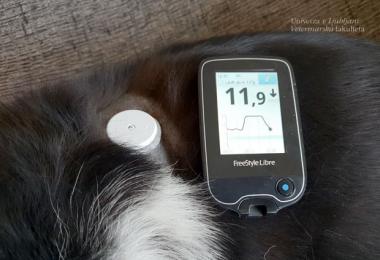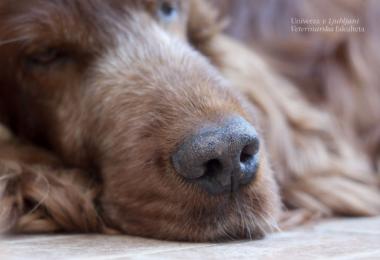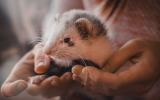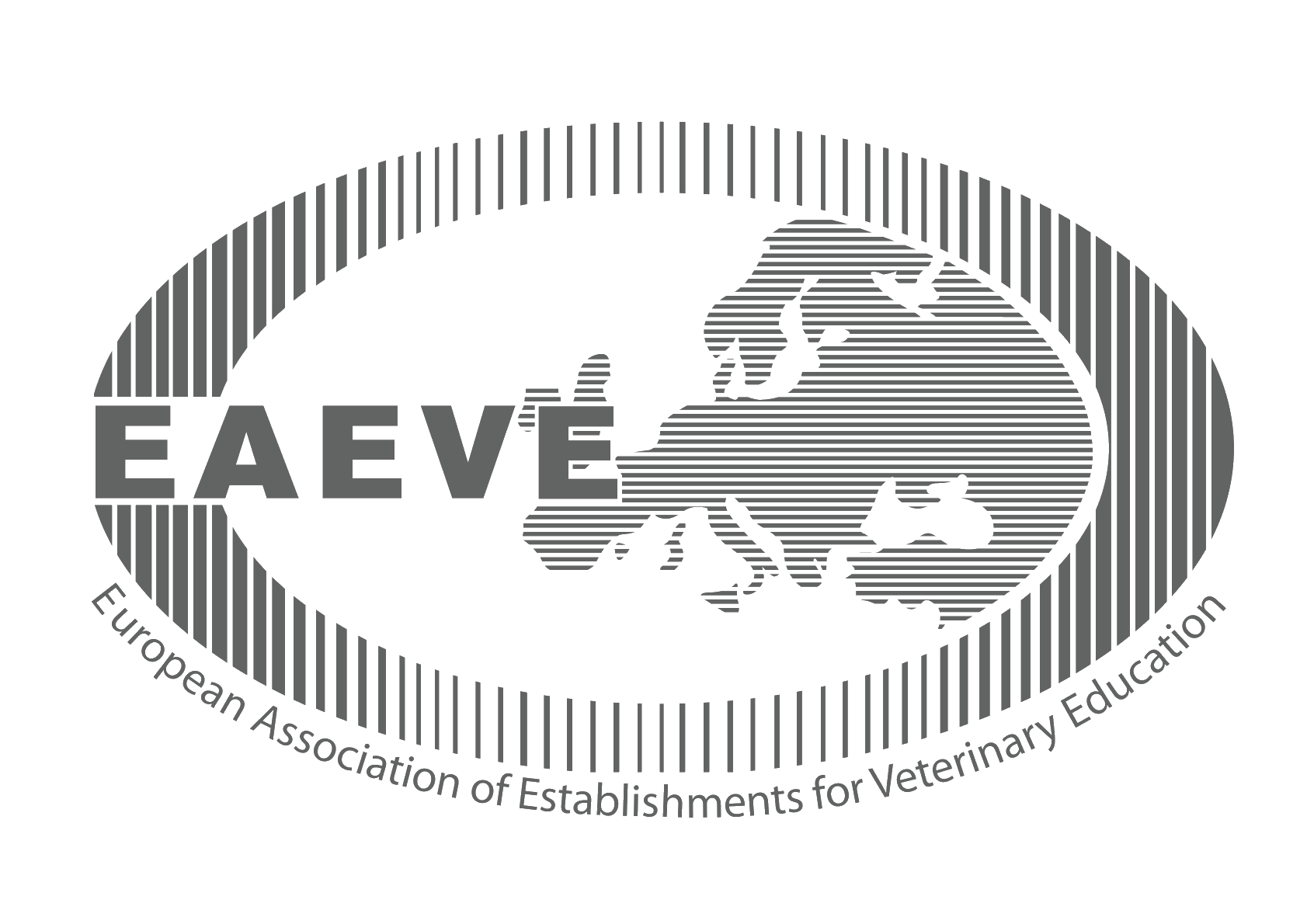Subscribe to our service announcements and helpful tips.
Coronavirus – recommendations for owners of domestic animals
Updated on 1. 4. 2020
Recommendations from the Faculty of Veterinary Medicine to owners of domestic animals in the event of infection with SARS-CoV-2 coronavirus.
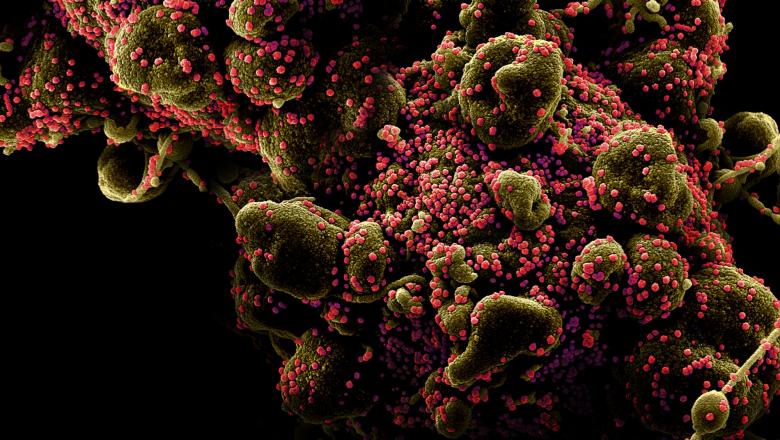
Colorized scanning electron micrograph of an apoptotic cell (greenish brown) heavily infected with SARS-COV-2 virus particles (pink), isolated from a patient sample. Credit: NIAID
Coronavirus SARS-CoV-2 and COVID-19
In December 2019 several cases of human pneumonia were detected in Wuhan, China. The usual pathogens of respiratory diseases were excluded in these patients and infection with the new coronavirus was confirmed. The infection spread to different continents in a relatively short period of time. The new coronavirus was named SARS-CoV-2, and the disease caused by the virus was named COVID-19. The disease is characterised by: fever, malaise, fatigue, shortness of breath, a cough, and, in severe forms, difficulty in breathing. About 80% of those infected have a mild form of the virus. Based on the clinical signs of the virus, infection with the new coronavirus cannot be distinguished from other respiratory infections, thus microbiological testing is required.
Coronaviruses (CoV) are RNA viruses that belong to the Coronaviridae family. Coronavirus infections are common in humans and animals. Alpha and beta coronaviruses usually infect mammals, while gamma and delta coronaviruses infect birds and fish. Coronavirus SARS-CoV-2 is a beta-coronavirus. Beta-coronaviruses also include SARS-CoV (a coronavirus that causes acute respiratory distress syndrome - SARS) and MERS-CoV (a coronavirus that causes Middle Eastern respiratory syndrome - MERS). SARS broke out in 2002 in China. The new SARS-CoV-2 coronavirus is genetically more similar to SARS-CoV than MERS-CoV.
Can Coronavirus SARS-CoV-2 originate in animals?
Human-isolated SARS-CoV-2 is 96% identical to beta-coronaviruses isolated from several bats of the Rhinolophus genus. Genetic analyses of SARS-CoV-2 and beta-coronaviruses isolated from bats indicate that the predecessors of SARS-CoV-2 are derived from bats of the Rhinolophus genus. Bats belonging to this genus are widespread in Asia, the Middle East, Africa and Europe.
It is very likely that an intermediate host was involved in the transmission of SARS-CoV-2 from animal reservoirs (bats) to humans. No information is currently available regarding a potential intermediate host, but these may be various species of animals including wildlife, domestic animals (pets or reared) or stray animals.
What to do in the event of contact with animals and animal products?
The World Health Organization (WHO) recommends general hygiene measures for the handling of live animals and animal products. This means regular washing of hands with soap and running water after contact with animals and animal products, avoiding touching the eyes, nose and mouth, and taking special care when dealing with diseased animals or rotten animal products. The WHO also recommends avoiding contact with stray dogs and cats, rodents, birds and bats.
The WHO's standard recommendations for preventing the spread of infection are: regular washing of hands, covering the mouth and nose with your elbow when coughing or sneezing, and avoiding close contact with people with a respiratory tract infection. Hand washing can be replaced by disinfection if the hands are not visibly dirty. Although there is no evidence that SARS-CoV-2 is foodborne, careful handling of raw meat, milk and animal organs is recommended. Foods that are consumed raw (e.g. fruit and vegetables) should be washed thoroughly.
Can pets become infected with the SARS-CoV-2 Coronavirus?
The current spread of SARS-CoV-2 is due to the transmission of the virus to humans. According to the information collected, there is no evidence that pets can transmit the virus. Therefore, measures that could affect the welfare of domestic animals are not currently needed.
Veterinary services in Hong Kong have reported that two dogs that were in close contact with owners showing signs of the virus had tested positive for SARS-CoV-2. Both dogs were healthy and showed no clinical signs of disease.
On 18 March a case of a cat that showed signs of respiratory disease and tested positive for the presence of Sars-CoV-2 was reported in Belgium. The cat became infected from its sick owner through very close constant contact. The Faculty of Veterinary Medicine is aware of this case and is monitoring it closely, however, for now there is no new information to indicate that it is necessary to change any of the instructions found on its websites. It appears that the cat was infected by a human being through very close contact, but so far there is no evidence that infection could occur in the opposite direction, i.e. that a cat or dog could infect a human.
In developing a vaccine for SARS-CoV-2, researchers have so far tested Syrian hamsters (Mesocricetus auratus) and ferrets (Mustela putorius furo). Both types of animals were found to develop clinical signs of respiratory and gastrointestinal disease when subjected to significant amounts of experimental infection of the SARS-CoV-2 virus. All the infected animals have since recovered. The Syrian hamsters also developed antibodies against SARS-CoV-2 viruses following infection. The animals in both experiments eliminated the virus that infected the uninfected animals living with them. The results of these studies indicate that under experimental conditions SARS-CoV-2 can be transmitted from infected to healthy Syrian hamsters and ferrets. However, this does not mean that this virus can be transmitted from people to these two species of animals, or vice versa, or that these two species could transmit the virus and could be infected by humans. A safe and effective vaccine against SARS-CoV-2 could be key in curbing the COVID-19 pandemic and ensuring human health. Development of vaccines is a demanding and time-consuming process based on numerous studies, including the choice of the species of animal on which the vaccine will be tested.
At this time, there is no evidence of the transmission of the virus from animals to humans and, according to all known data, pets do not pose a risk to humans. There is no evidence that animals could spread the virus or become ill due to infection with SARS-CoV-2. Many additional studies will be needed to investigate the possible role of domestic animals in the epidemiology of the disease, especially in the case of domestic animals from households in which people have confirmed or suspected cases of SARS-CoV-2.
Should people with an acute respiratory infection avoid contact with pets?
People with acute respiratory tract infections are advised to limit contact with domestic animals. This means that they should not stroke, hug or caress, or share food with pets, and pets should not lick infected people. It is recommended that animals are taken care of by another person in the household who is healthy. If the infected person cannot avoid contact with their pets, they should wear a face mask and wash and disinfect hands before and after contact with the animals.
What to do with pets that have been in contact with a person who has been infected with the SARS-CoV-2 coronavirus
The current spread of SARS-CoV-2 is due to the transmission of the virus among humans. According to the information collected, there is no evidence that domestic animals can transmit the virus or become infected with the SARS-CoV-2 virus. However, since animals and humans can share diseases (known as zoonotic diseases), humans infected with SARS-CoV-2 are advised to limit their contact with domestic animals. Basic hygiene measures must be followed when handling and caring for animals. This includes regularly washing hands before and after handling animals and animal feed. Stroking, hugging, caressing and sharing food with pets should be avoided. People who are ill and/or quarantined due to a possible SARS-CoV-2 infection should avoid close contact with domestic animals as much as possible. Pets should be taken care of by other household members. If this is not possible, maintain good hygiene and, in as much as it is possible, a mouth and nose mask should be worn.
What to do if your pet becomes ill after being in contact with a person infected with the SARS-CoV-2 coronavirus
Call your vet to arrange a visit. DO NOT visit a veterinary clinic without first consulting with the staff there.
Can a pet that has been in contact with an infected person pass on the infection to other people?
The current spread of SARS-CoV-2 is due to the transmission of the virus among humans. According to the information collected, there is no evidence that pets could transmit or become infected with the SARS-CoV-2 virus.
Is there a preventative vaccination for pets that prevents infection with the SARS-CoV-2 coronavirus?
No.
What should those in self-isolation do with their pets?
People under quarantine or self-isolation are advised to keep their animals with them. Animals should be allowed outside as little as possible.
If you live in a detached building with its own courtyard/garden and providing your health permits, you can take your dog out to the courtyard/garden but only for the time required. Dogs should not be left unattended!
If you live in an apartment building or your health is poor, you should allow your dog to do the necessary, i.e. go to the toilet, inside. Choose a location where the dog can go to the toilet - a space that can be cleaned - and lay out a nappy or an old sheet, towel etc. Dispose of the faeces in the toilet bowl. Cats should not be let out, rather a litter tray should be provided.
Persons who have been confirmed as being infected with SARS-CoV-2 are advised to avoid contact with animals. Basic hygiene measures must be followed when handling and caring for animals. This includes regularly washing hands before and after handling animals and their food. Stroking, hugging, caressing and sharing food with animals should be avoided. People who are ill or quarantined due to suspected infection with SARS-CoV-2 should avoid close contact with domestic animals as much as possible. Pets should be taken care of by other household members. If this is not possible, maintain good hygiene and, in as much as it is possible, a mouth and nose mask should be worn.
In the event that a pet owner is hospitalised, the animal should be kept at home and taken care of by other household members.
What should pet owners do in the event that they are admitted to hospital due to being infected with coronavirus infection and do not have anyone to look after their pet(s)?
Patients who are under quarantine or in self-isolation and whose condition deteriorates to such an extent that hospital care is required should NOT bring their animals to an animal shelter. Since the situation is changing rapidly and varies between municipalities, ensure you check with the competent shelter or other competent authority to find out how to properly handle the situation in a particular municipality.
Can the virus survive in the environment?
It is currently not known how long-lasting SARS-CoV-2 is. It is assumed to be similar to other coronaviruses. The results of research have shown that human coronaviruses, such as SARS-CoV, MERS-CoV and HCoV, are infectious on metals, glass or plastic for up to nine days. Viruses are effectively inactivated through disinfecting surfaces using 62 to 71% ethanol, 0.5% hydrogen peroxide, or 0.1% sodium hypochlorite. The disinfectant should be on the surfaces for at least one minute. As there is no specific treatment available for SARS-CoV-2, early inhibition and prevention of further spread will be critical in stopping the onset of the virus and in controlling the spread of this new pathogen.
Learn more about the home cleaning process on the following link.
How should pets be kept clean?
Learn more about keeping your pets clean and the home cleaning process on the following link.
Care of animals, such as horses, in another municipality
At this point in time it is still permitted for those with animals housed in another municipality to travel there to take care of their animals, as this is considered an urgent need, which is permitted by the Decree on the temporary general prohibition of movement and gathering of people in public places and areas in the Republic of Slovenia and the prohibition of movement outside the municipalities. Source
(Extracted from recommendations by the World Health Organization (WHO), the World Organization for Animal Health (OIE), the National Institute of Public Health (NIJZ) and the World Small Animal Veterinary Association (WSAVA))
Should you have any questions about the new SARS-CoV-2 coronavirus and domestic or wild animals please send them by email to: koronavet.vf@vf.uni-lj.si. We will answer your questions as soon as possible.
Location
Gerbičeva 60
SI-1000 Ljubljana
Slovenija
Sample Reception
Samples are received at several locations throughout Slovenia. See where.
The veterinarian on duty
Emergency veterinary assistance for dogs and cats and a telephone number of constant readiness.
Library
A wide selection of domestic and foreign professional literature in the field of veterinary medicine and other sciences.
Main navigation
-
Education
- Informativni dan
- Why to become a veterinarian?
- Undergraduate Studies
- Postgraduate studies
- Pripravništvo
- Summer Schools
- Continuous education
- Professional Development
- International Activity
- Mednarodna dejavnost - Tuji študentje
- The Path to Creative Knowledge
- Tutoring
- Extracurricular Activities
- Career Centres
- Alumni
- Student organizations and societies
- Quality Assurance
- Clinics
- Diagnostics
- Dobrobit
- NVI
- Research
- About us
- Hub

